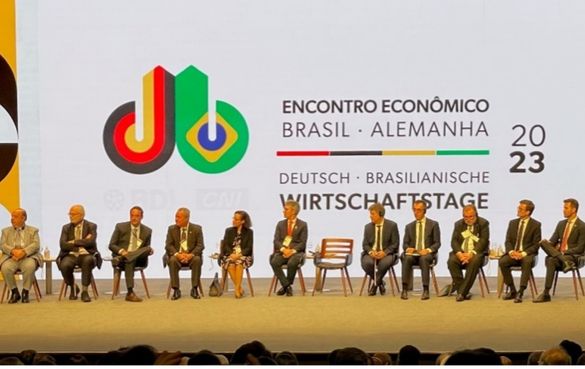On the 13th and 14th oh March, RUCR Law has participated on the 39th annual edition of the Brazil-Germany Economic Fair. This event, hosted in Belo Horizonte, was organized by the Nacional Confederation of Industry (CNI, Brasil), by the Federation of German Industries (BDI) and by the Federation of Industries of Minas Gerais (FIEMG). In this edition, the main theme was: “New approaches to energy, climate and digitalization.”
Germany is Brazil’s forth largest trading partner and, in 2022, the trading balance between both countries has surpassed the mark of 19 billion dollars, reaching its highest level since 2014. In this sense, the Economic Fair envisages to promote a bond always tighter between these countries, stimulating the creation of strategic partnerships and cooperation opportunities, aiming not only at the commercial or trading connections, but also at the common challenges that both Brazil and Germany are going to face in the near future. Among the discussed subjects, it is possible to highlight the focus on science, technology, innovation, and environmental care.
Within the panels, the speakers have brought discussions about: analysis on value chains; circular economy, renewable sources of energy and sustainability; and geopolitical challenges. Regarding this last topic, many of the interventions proposed a higher approximation between the European Union and the Mercosur. The possibility of a brief conclusion of the commercial agreement between Mercosur and EU, as well as the development of a treaty to avoid the double taxation are other rather important points to widen this partnership, indicated CNI.
The President of BDI, Professor Siegfried Russwurm stressed the strategical importance that Brasil holds with Germany and their interest in deepening both economic cooperation and integration. He based his speech on the search for the decarbonization with renewable and efficient sources of energy, preservation of the Amazon rainforest; digitalization and regulation of cybersecurity; and a higher degree of practicality in the countries’ cooperation.
Flavio Roscoe, President of FIEMG, highlighted that 95,4% of Minas Gerais’ energy source is renewable, thence, foreign companies are able to lower their carbon footprints by buying Brazilian energy. Thus, goods manufactured in Brazil have a reduction in their carbon emissions and in their environmental footprint.
RUCR Law has a specialized team, ready to help German companies with their demands in Brazil. We are also part of the Global Advocaten Network, which provides us with a full range of partner attorney’s offices, making us able to assist Brazilian companies present in Germany as well.

